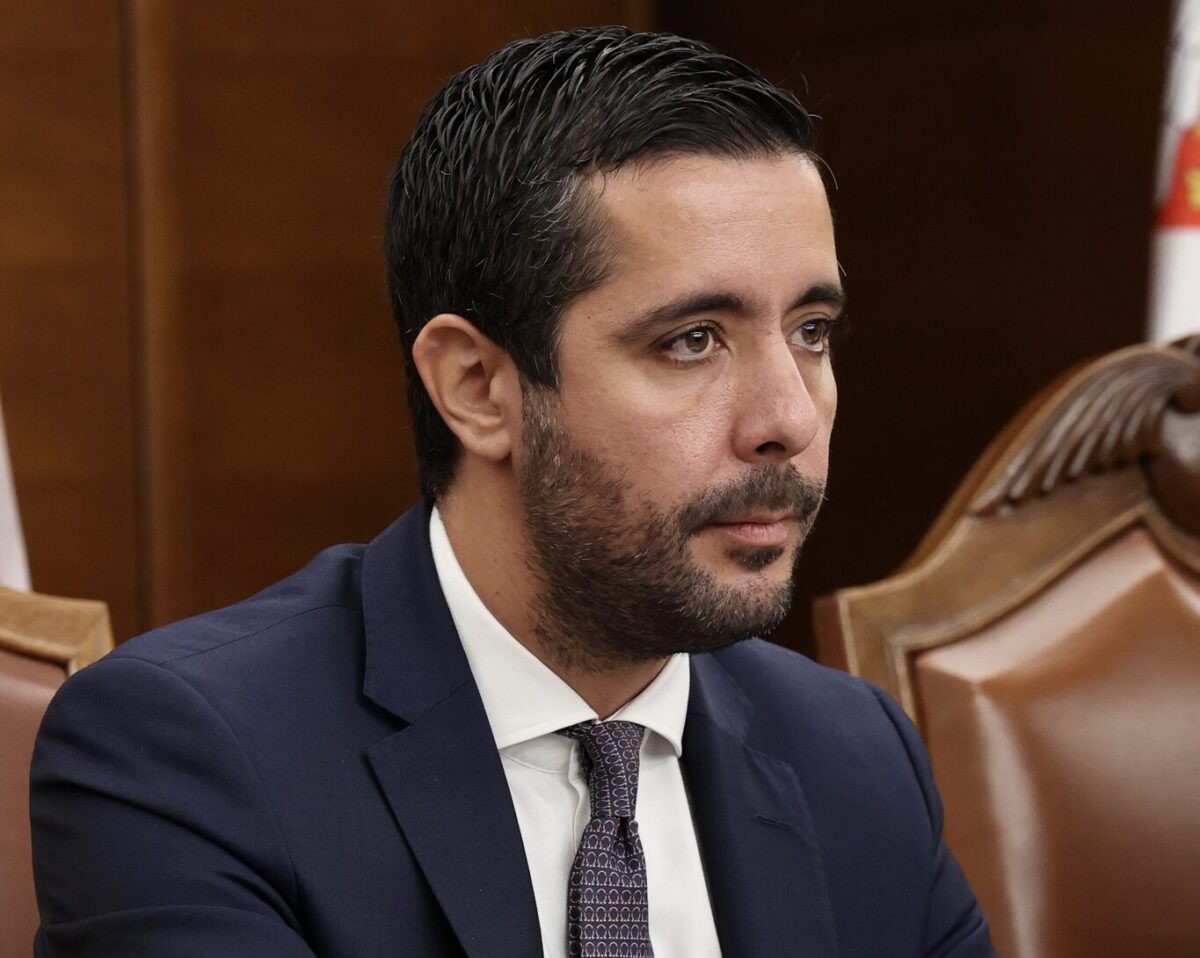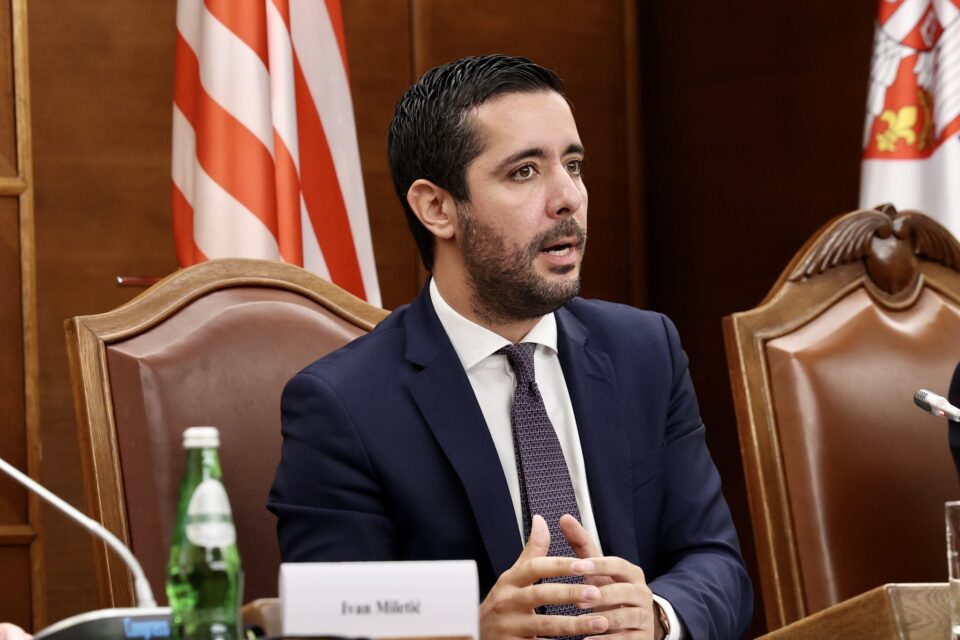Our priority is to preserve the peace so that we can maintain the current economic growth and good economic winds that are currently blowing in the region

Serbia and the whole world are facing a major crisis. Inflation is rampant everywhere, the market is unstable and geopolitical turmoil affects all economic activities, while Serbia also has a problem with the ban on trade in Serbian goods in Kosovo and Metohija. We talked about all this, as well as the Government’s activities on the resolution of these problems, with the Serbian Trade Minister, Tomislav Momirović, who recently participated in the Day of America conference.
What is the current position of Serbia in the region? Could you tell us in trading with which countries we achieved a positive balance?
Serbia has become an important economic factor in this part of Europe and in addition to the challenging two years during which the European economy has been facing a war in the east of the continent, we managed to preserve the stability of our economy and the trust of consumers and investors. This is evidenced by the cumulative real growth of the national GDP from 2020 to 2022 of about 9%, record foreign direct investment influx that amounted to 4.4 billion euros, continued growth of employment and earnings in the private sector, as well as the highest level of foreign currency reserves since 2000. Furthermore, the country’s public debt is still far below the Maastricht criteria and stands at 51% at the end of the first quarter of 2023. Serbia also has a record-low unemployment rate, which in the last quarter of 2022, was 9%, with a constant downward trend in the last 10 years.
In order to continue this economic growth that has lasted for the last ten years, it is extremely important to develop trade in the region and our cooperation. In that respect, the Open Balkans initiative can serve as an excellent basis for the further continuation of European integration process. Boosting economic cooperation is of key importance for better positioning of the region on the maps of potential investors, as well as for consolidating stability and creating conditions for faster integration of all countries into European structures, which is a common goal.
The Better Price campaign is active in over 2,500 stores across Serbia
The CEFTA countries are the most important trade partners of the Republic of Serbia in terms of economic results, and in terms of total trade, they are traditionally the second biggest trade partner of our country, after the EU. From January to July this year, our country generated a surplus in the amount of 1.7 billion euros in trading with the CEFTA countries. Bosnia and Herzegovina, Montenegro and North Macedonia are traditionally among the most important trading partners of Serbia and we have been recording significant results in trading with these countries, particularly in exports. The trade with them has been growing year-on-year, with Serbia recording a trade surplus. In the first seven months of this year, Serbia recorded a surplus in trade with all CEFTA countries, especially in trading with Montenegro in the amount of 628 million euros, Bosnia and Herzegovina 553 million euros and North Macedonia 301 million euros.
Will the problem of Serbia selling its goods in Kosovo and Metohija be resolved soon? Does the international community support Serbia in this “trade dispute”?
Pristina’s decision to stop the import of Serbian goods to Kosovo is completely contrary to all European principles, which include the free flow of people, goods, services and capital. We see that the authorities in Pristina are not ready to talk but base their policy on incidents. Our priority is to preserve the peace so that we can maintain this economic growth and the good economic winds that are currently blowing in our region. I hope that, in the best interest of our economies, Serbian and Albanian companies, and long-term peace and stability, we will find a solution which entails abolishing all restrictions.
This political decision of Pristina, above all, is a direct violation of the CEFTA agreement and free trade principles and is not based on economic reasons. By implementing this decision, Pristina is deliberately causing an inevitable humanitarian crisis because the Serbian population in Kosovo and Metohija depends on basic food products delivered from central Serbia. Given the series of measures that Pristina has adopted recently, the complete ban on the sale of Serbian goods can be seen as a continuation of escalation and a means of pressure.
On several occasions, I addressed the European Commission, trade ministers of the EU member states, as well as representatives of the US administration regarding this problem. The European Commission has called on the Pristina authorities to lift all restrictions on the sale of Serbian products. This situation must be stopped as soon as possible because such decisions by the Pristina authorities are extremely dangerous and are, as I said earlier, a direct violation of the CEFTA agreement and free trade principles.
Still, I see room for a solution. I strongly believe in the power of the market and people who are committed to business and not to fueling conflict. The biggest damage of such a decision is that this is severing the business ties that have always existed between Albanians and Serbs. There are a lot of successful business people in the Albanian community and this situation does not suit anyone. Both Serbian and international companies are suffering enormous damage, but the people, Serbs and Albanians who live in Kosovo, bear the greatest damage.
Serbia’s exports of IT industry services stood at 2.5 billion euros
It is clear to us that inflation significantly affects the decline of people’s living standard. How do you fight against it and what are the results of the measures implemented so far?
The Ministry that I helm has been constantly communicating with our citizens, within the limits of our competencies, in order to create responsible policies, which above all, will ensure a stable supply for our citizens in these challenging times. After a detailed analysis we conducted together with retailers, we launched the Better Price – Price for the People campaign during which all the retailers, in cooperation with their suppliers, will sell at least one product from 36 product categories at a significantly reduced price. At the moment, the Better Price campaign is active in over 2,500 stores across Serbia. Our goal is to provide support to our people, to make them feel the value of this campaign and to feel that they can buy more for their money. We will not give up on that.
The IT industry in our country has been recording significant growth. What is this sector’s share in Serbia’s total exports?
Serbia is now recognized for its exceptional workforce in the IT industry. A large number of engineers and IT companies are doing great in different markets worldwide. Serbia’s total export of services in 2022 was 11.1 billion euros, while the export of IT industry services alone was 2.5 billion euros. To compare, in 2012, the total export value of services was 3.1 billion euros and computer-related services 221 million euros. This is a very illustrative indicator of the growing importance of these services for our exports and economy.
What do you intend to do about challenges in international trade, such as those related to global competition and trade agreements?
As a result of the pandemic and the war in Ukraine, global flows in world trade have changed significantly, so the world has turned from globalization to regionalization and near-shoring instead of off-shoring. With this in mind, we have set goals for the next period, taking into account the fact that we are in a historically very difficult moment that the world has not seen for decades.
In terms of external trade, our policy will be directed towards opening new markets for our companies and concluding new free trade agreements. In addition to working on adequately implementing and further improving existing agreements with the EU, CEFTA, Eurasian Economic Union, Turkey, EFTA and Great Britain, the Government’s goal is also to negotiate and conclude new agreements with other very important partners. Accordingly, the agreement with the People’s Republic of China has already been negotiated and is expected to be signed in the coming period, while we are currently conducting negotiations on free trade with Egypt and the United Arab Emirates. We expect to start negotiations with South Korea soon. The conclusion of these agreements would open up additional and largest world markets for our companies, which have a total of more than one billion employees.
